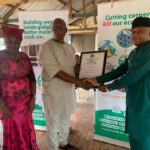By Kemi Akintokun, News Agency of Nigeria (NAN)
Over the decades, the outbreak of diseases have always highlighted the importance of advancement in medical research to curb their spread and negative impact on people.
These include the most recent pandemic – COVID-19 – which ravaged Nigeria and the global population.
The SARS-CoV-2 that causes COVID-19, first reported in Wuhan, China, spread rapidly across the world, prompting the World Health Organisation (WHO) to declare the virus a pandemic due to its devastating impact.
Developed countries and giant pharmaceutical companies within a year introduced vaccines and thereafter, booster shots, to tackle the various variants of the virus.
In a race to reduce the heavy burden of the virus that killed thousands of people daily in most of the reported cases in countries, including the U.S,, UK, Japan, Spain and Italy, vaccine nationalism birthed.
Governments of these countries signed agreements with pharmaceutical manufacturers to supply their populations with vaccines before making them available for others.
Even before many of the now-approved COVID-19 vaccinations completed their clinical trials, many of these wealthy nations bought several million doses of the ones that seemed the most promising, leaving Africa at the mercy of COVAX.
COVAX, a global vaccine programme, was setup to provide innovative and equitable access to COVID-19 diagnostics treatment and vaccines.
In Nigeria, the Nigerian Institute of Medical Research (NIMR) was among the health institutions in the forefront against the spread of the virus, after recording the first COVID-19 case in Feb. 28, 2020.
The NIMR, established in 1977, conducts research into diseases of public health importance in Nigeria.
A month after the first detected case in Nigeria, the Institute started a free COVID-19 drive through test centre in the country in collaboration with LifeBank and had tested more than 10,000 Nigerians for free.
It also unveiled a Biotech Total RNA Purification Kit, developed by one of its Scientist, Dr Muinat Fowora.
This is Nigeria’s first set of local Ribonucleic Acid extraction kits, which expanded the nation’s capacity to test for COVID-19.
Also, two of its scientists, Dr Chika Onwuamah and Mr Joseph Shaibu, developed a SARS-CoV-2 Isothermal Molecular Assay (SIMA), a fast and sensitive point-of-care test for COVID-19 infection using a molecular technique and a SARS-CoV-2 Detection Assay (SCODA), a qPCR assay respectively.
In spite of the institute’s emergency response to COVID-19, it also conducted research into diseases of public health importance and developed structures for the dissemination of research findings.
For instance, in 2021, NIMR unveiled a Lassa fever and Yellow fever diagnostics kits – the first of its kind in Nigeria.
Also in 2022 it produced diagnostic PCR and ELISA kits for Monkey Pox, SARS-CoV-2, and Cholera; oligonucleotide synthesis, cloning, and expression of viral proteins.
Similarly, two NIMR laboratories maintained their ISO accreditation and WHO prequalification.
For Prof. Akin Abayomi, the Lagos State Commissioner for Health, government should enable NIMR to conceptualise research ideas and translate them into innovations that would advance healthcare delivery.
Abayomi notes that NIMR has the resources required to actualise its mandate as the quaternary research institute in Nigeria.
“NIMR is the quaternary institute and this is equivalent to the National Institute of Health in the U.S and I hope the federal and state government will recognise NIMR for what it is.
“Government must do more to support NIMR in the areas of research that will proffer solutions to our health problem as a nation
“Most of the grant attracted to the institute are foreign grants and there are strings attached to these grants, but if they are internally generated, it will focus more on our problem,’’ he said.
According to a former Minister of State for Health, Olorunibe Mamora, NIMR, continues to impact the promotion of healthcare delivery in Nigeria through some of its research.
Mamora described the various diagnostic kits unveiled by the institute as a ground breaking research work.
“What we are witnessing in NIMR is a system that is working and the government is proud of the institute because this giant stride will continue to aid research in the country.
“Early diagnosis is key and extremely critical to prompt treatment of diseases such as yellow fever and Lassa fever that are of public health concern to Nigeria.
“Diagnosis is the most important step in the management of a patient because you cannot treat what you don’t know.
“Yellow fever and Lassa fever, over the years, had resulted in many causalities due to late diagnosis, but measures like this will make diagnosis tools readily available around the country,’’ he said.
Speaking on the institute gains and challenges, Prof. Babatunde Salako, the Director-General of NIMR, says COVID-19 is a blessing in disguise for the institute.
“The negative impact of COVID-19 was felt globally in terms of deaths and the economic halt it created but it was also a blessing in disguise for us in NIMR.
“We were able to support the case detection through our drive through testing ground and production of a locally made test kits for the purpose.
“We did not stop there, we also produced test kits for Lassa fever, yellow fever and Monkeypox diagnostics kits and we have the capacity to produced diagnostics kits for any disease,’’ Salako said.
He notes that Nigeria must begin to fund research work that proffer solutions to diseases that peculiar to it through the establishment of a medical research council..
“There is the need for the establishment of a medical research council to fund research works peculiar to Nigeria.
“Medical research councils all over the world are in charge of research and research funding for most of their countries to fund research in areas of priorities.
“Creating such a council requires that government must give funding specifically for health research and look at areas of priorities, where we have challenges and ways to proffer solutions.
“The council, if put in place can work with the Federal Ministry of Health, on research priorities and policy for all medical institutions in the country.’’
According to him, funding and inadequate research are some of the problems affecting the institute and if addressed will make the mandates of the institute, which is to conduct research into diseases of public health importance, more realisable.
“The government has done a lot in terms of funding, we are grateful for the improvement; but we still need more to enable us to conduct more research.
“Some of our staff retired and we are yet to get replacements. Some of them also travelled abroad for greener pastures,’’ he said. (NANFeatures)(www.nannews.ng)
***If used, please credit the author as well as the News Agency of Nigeria (NAN).
Edited by Dianabasi Effiong/Vivian Ihechu











